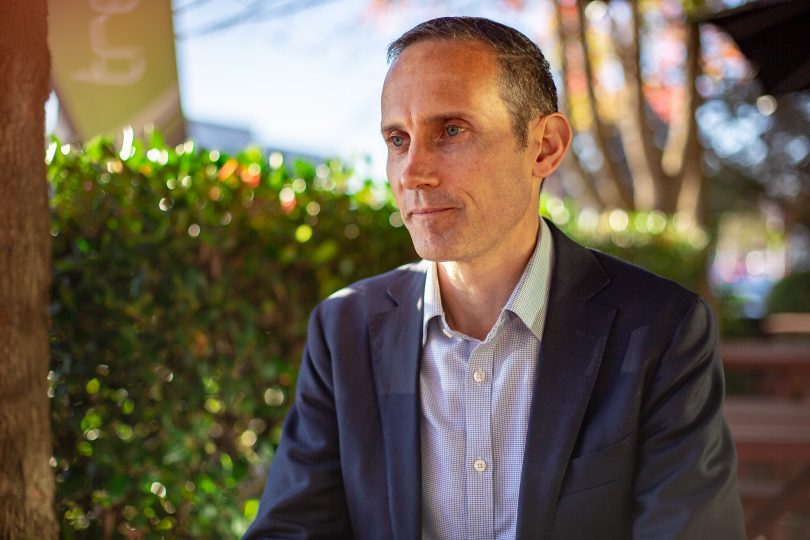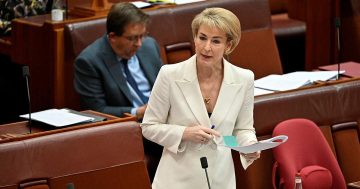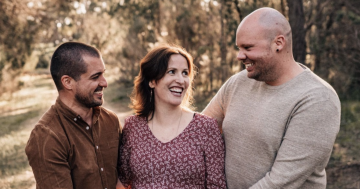
Member for Fenner Andrew Leigh says the time has come for Canberrans to vote on the right to die. Photo: File.
What do 87 per cent of Australians agree about? Not which party to vote for, and certainly not which football code to barrack for. You also wouldn’t find 87 per cent agreeing about tax, or whether cats make better pets than dogs.
Yet when it comes to voluntary assisted dying, the ABC’s Vote Compass survey in 2019 found that 87 per cent agreed with the following statement: ‘Terminally ill patients should be able to end their own lives with medical assistance’. That included 79 per cent of Coalition voters, 77 per cent of Catholics and 76 per cent of Protestants.
Some Canberra families have suffered enormously because of the current laws. Earlier this year, I met with Katarina Knowles, whose father, Nebojsa Pavkovic, was left unable to walk and talk after suffering from Parkinson’s disease.
Eventually, he opted not to use a feeding tube – effectively starving himself to death. It took five weeks for him to die.
“He was really, truly bedridden and it was just the worst,” described Ms Knowles.
In recent years, five of Australia’s six states have passed laws legalising euthanasia. At the end of October, the sixth and last state, NSW, will begin debating the topic. If it passes, every state in Australia will have allowed voluntary assisted dying.
In some sense, this is not surprising. For more than a generation, a majority of Australians have supported voluntary euthanasia. Parliament is finally catching up to popular opinion.
Yet not everyone will have the right to die with dignity. In the ACT and Northern Territory – home to around 700,000 people – voluntary assisted dying will remain illegal, thanks to a bill that passed the Federal Parliament in 1997.
Back then, the target of the bill was the Northern Territory, which had moved ahead of the states by passing euthanasia laws. Federal parliament not only struck down its laws, but for good measure also banned the ACT from enacting voluntary assisted dying legislation.
The result now is absurd. Australia’s most progressive jurisdiction is barred from passing laws that are supported by nine out of 10 Australians, and which already apply across most of the country.
During the years, I have stood up for territory rights by attempting to remove the ban on the territories enacting euthanasia laws. In the last parliament, I moved a private member’s bill alongside Luke Gosling MP, who represents the Darwin seat of Solomon. In this particular parliament, I moved a private member’s motion calling on the Morrison Government to bring on a debate over territory rights.
Many of the arguments used by supporters of the 1997 law now apply in reverse. Back then, it was said the territories should be prevented from rushing ahead of the states. Now, they’re trailing behind.
Back then, it was said the ban was necessary to prevent people migrating to the Northern Territory to die. Now, there is a real prospect that territorians who wish to end their lives might relocate to a state.
Support for repealing the bar on territory euthanasia laws spans a wide spectrum, including some – such as Luke Gosling and David Smith MP – who support territory rights despite having reservations about euthanasia.
Every member of the ACT Legislative Assembly supports territory rights. At the federal level, every territory representative in the House of Representatives – Alicia Payne, David Smith and myself – supports territory rights. And three of the four territory senators – Katy Gallagher, Malarndirri McCarthy and Sam McMahon – support territory rights.
The sole holdout is Senator Zed Seselja, a politician so conservative that he voted against territory rights in 2018, and whose well-known opposition to territory rights caused his Northern Territory Coalition colleague, Senator Sam McMahon, to drop references to the ACT from her territory rights bill. It’s something Seselja’s predecessor, Gary Humphries, never would have done.
Has a more anti-territory politician ever represented a territory than Seselja?
Back in the 1990s, not everyone in Federal Parliament wanted to deprive territories of the right to pass euthanasia laws. As a newly elected member of parliament, Anthony Albanese told the House: “I oppose this bill because I support human dignity. I oppose this bill because I support freedom of choice. I oppose this bill because I support civil liberties. I oppose this bill because my Christian upbringing taught me that compassion is important.”
A quarter of a century on, it’s becoming clear the Morrison Government is determined to keep opposing territory rights. They won’t budge even if NSW joins the other five states in enacting euthanasia laws.
The dismissive response of Attorney-General Michaelia Cash to ACT Minister for Human Rights Tara Cheyne shows the Liberals have no intention of repealing this cruel limit on the democratic rights of territorians.
It will take an election – not a polite letter – to bring about change because under the Morrison Government there’s Buckley’s chance of the ACT getting our democratic rights back.
Andrew Leigh is the Federal Member for Fenner, and Shadow Assistant Minister for Treasury and Charities. His website is andrewleigh.com.




















